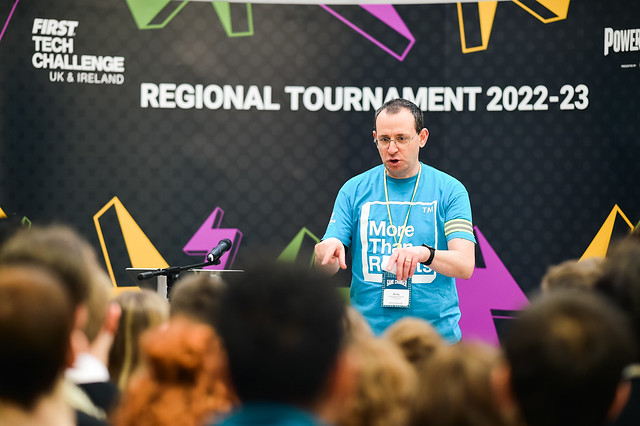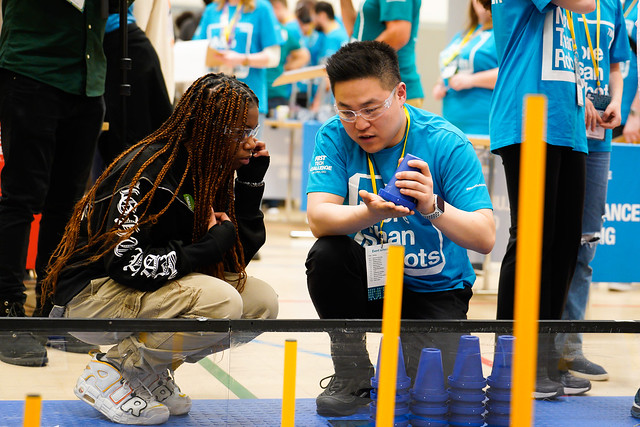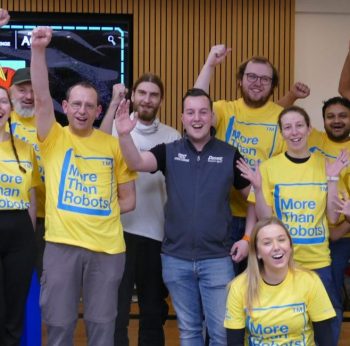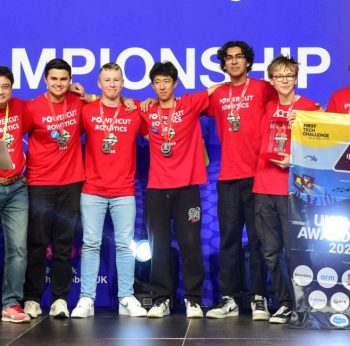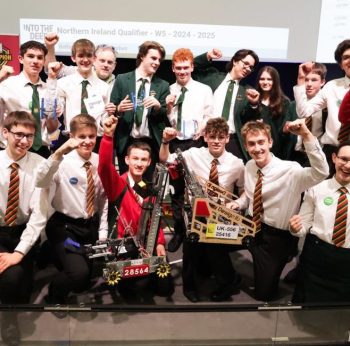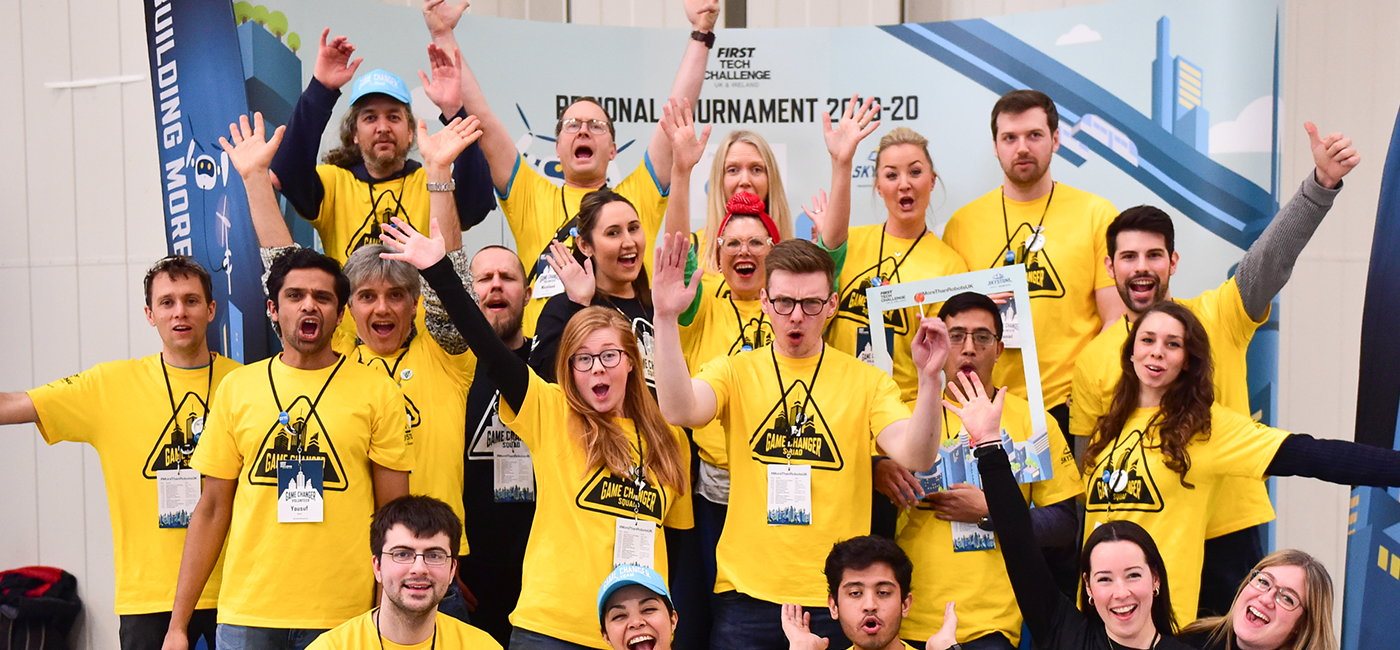
More than a partnership
We knew when forming the charity in 2018 its engine would be industry. Not simply the fuel in terms of funding, but critically – people. This isn’t just about coding and engineering – its about making connections between the workplace and the classroom – empowering young people with the knowledge and skills they need to take on tomorrows jobs. We can only do this with people who occupy those roles today – possessing the experience, passion and mindset to inspire.
One of our earliest adopting supporters was Arm – a shining beacon of the UK tech industry and a world leader in semiconductors. If you have a phone, tablet, smart TV, car – something which needs processing power – it’s likely using an Arm microchip. 70% of the world’s population are impacted by an Arm chip in their daily life (there’s 250 billion of them worldwide). Arm technology even powers our FIRST Tech Challenge robots!
Over 6,000 diverse, smart creatives worldwide call Arm their employer – and we’re fortunate a significant portion of them choose to donate their time as mentors and event volunteers. This month we spoke to Anna Malan, Senior Manager, Employee Community Engagement – to take a peek inside one of the UK’s most successful companies and find out how she galvanises Team Arm to help us build More Than Robots.
Who is Arm – what do they do, how many people do they employ, where in the world and what sorts of jobs?
Arm is a foundational technology company – we design the semiconductors, or ‘chips’, that power 95% of the world’s mobile technology. About 6,000 people work at Arm, and around half of them are in the UK, but we have offices all over the world, with big sites in Austin, Bangalore and Sophia-Antipolis as well as our headquarters in Cambridge. A lot of people who work at Arm are engineers; both hardware and software. But there’s a huge range of other roles, too, from lawyers to accountants, people who work in marketing, sales and HR.
Who are you? what do you do at Arm – what’s a typical day at work look like for you?
I’m Anna, and I run Arm’s employee community engagement programme; Team Arm.
“Everyone at Arm can use half a day per month to volunteer, and it’s my job to inspire them to do so.”
This is coupled with an objective to support the communities where we live and work, with a strategic focus on education outreach. Day to day, that might mean that I’m writing comms for an upcoming campaign on food poverty, meeting with charity partners to plan an event, or running a virtual volunteering session for employees around the world. My day also includes plenty of the boring stuff – emails, budgets, contracts – but what I do is varied and impactful. I live in Sheffield so, at the end of my working day, you’ll find me heading out on a run in our lovely natural surroundings.
What’s it like to work for Arm – what drew you to your current role and what do you enjoy most about it?
The culture at Arm is unique; I’m surrounded by kind, curious and intelligent people who love to challenge each other. As a business, Arm takes good care of its employees. Prior to joining Arm, my background was in the charity and education sectors. I had some experience of working with corporate partners, and was interested to see how things were on the ‘other side’. I have been surprised by what a large impact I feel I’m able to have in the corporate sector; Arm is very intentional with where we put our charitable funding and I love being able to work closely with local, national and global charities to make great things happen in the communities where we live and work.
In the old days (at least when this interviewer was in his thirties a few years ago), we used to talk a lot about CSR (Corporate Social Responsibility), now everyone seems to be shouting about EDI (Equity, Diversity, Inclusion). What is EDI and why it is it so important?
It’s true that EDI has increased in visibility in recent years, but I consider it to be closely connected to CSR. To throw in another acronym, both our CSR and EDI efforts are crucial for our overall approach to ESG (Environment, Social and Governance).
“For businesses, EDI is about creating an inclusive environment, where representation is considered, people are valued for their differences and everyone’s skills and perspectives are made best use of. It’s important because a) it’s the right thing to do, but also because in industries such as ours, there is shortage of talent. If we want to attract and retain the best and brightest employees, an inclusive and equitable workforce is crucial.”
In my opinion, this starts years before the point of hiring someone. We need to be ensuring that young people of all backgrounds are considering school subjects that could lead them to a career in our industry.
How do charity partnerships like those with FIRST UK, help you and Arm drive the agenda and achieve positive impact?
Team Arm couldn’t do what we do without the charities that we partner with. Particularly where we’re looking to connect with school-age young people and inspire them about their potential within STEM (Science, Technology, Engineering and Maths), we rely on charities with unique and engaging delivery models. FIRST’s scale, both within the UK and globally, is a great example of helping Arm to get in front of young people who are already engaging with tech in action.
“What makes FIRST even more valuable to Arm is that they’re working hard to increase engagement with student demographics that might have initially ruled out tech and robotics as being for them.”
We don’t like to dictate what measured success looks like in this aspect. It’s very important to us that a charity partner is able to measure and quantify their success, but they know how best to do this and we’re reluctant to impose our own metrics on top of their own. A charity’s measures of inclusion, scale and difference as a result of the intervention tend to be the ones we pay attention to.
“An equally important aspect of our partnerships with charities like FIRST is how well they’re able to engage our employees.”
Part of Arm’s employee value proposition is that we support our people to take action on the causes that they care about, so offering meaningful ways that our people can use their time and skills to create positive impact is really important to us. In terms of measures of success here, we might look at the number of employees engaged in volunteering with a charity, or whether employees report an increased connection to, or sense of pride in, the company as a result of engaging with the charity.
What are you most proud about being involved, witnessing, or achieving in your time at Arm?
Tough question! On a daily basis, it’s the small, individual stories from how our colleagues are giving their time. In the last month, for example, we have had a group of colleagues in northern India giving up their evenings to distribute blankets to impoverished groups in their city, Noida. Over 250 colleagues made donations to an Arm-matched fundraiser for UNHCR and UNICEF following the earthquakes in Turkiye and Syria, raising over $40,000. Our colleagues in Cambridge have been visiting local primary schools to run micro:bit coding sessions for kids following requests spreading by word of mouth by teachers. At a more macro-scale, our philanthropic response to the COVID-19 pandemic is something I’m hugely proud of. Amongst other things, we distributed 145 grants to local charities in 18 locations to enable support to those most significantly impacted by the pandemic.
Isn’t a job at Arm all about microchips and semiconductors – surely I need to have a degree in computer science? What advice would you have for someone wanting work at Arm?
It doesn’t harm, but it’s not necessary. Advice would depend on the type of work you’re looking to do. If you do want to be an engineer, then there are options to join Arm as an apprentice if you don’t feel that university is for you. For those looking for early careers roles, this webpage has tons of information: https://careers.arm.com/
If you’re looking to join Arm in another capacity, it’s all about building up experience in that area. Passion will also get you a long way!
What’s been the best thing about collaborating with FIRST?
Anytime I get to hang out with FIRST at one of their own events! Seeing FIRST’s magic in action and watching young people’s faces lit up by what they’ve achieved in their teams is phenomenal. Beyond that, the FIRST UK team are a pleasure to work with; they’re enthusiastic, flexible and always up for bouncing ideas around together.
What do you think/hope the tech industry will look like in 10 years?
Very different, in a lot of ways. The projects that Arm work on tend to be about 5-10 years ahead of products hitting the market, so I can say for sure that our world will continue to be shaped and changed for the better by the power of technology. My hope is that the industry itself is more diverse. I would love to see more women at Arm and across our ecosystem, for example.
If you had unlimited resources – what would you do to make the world a better place?
I would want unlimited resources to be channeled towards protecting our natural environment from the impact of climate change. If only I had the answer to how those resources should be channeled in order to achieve this! If there was resource left over after that, I’d make the world a better place by creating the ability to filter whatsapp messages by ‘unread’, so that nobody ever left their friends and family left hanging with days on end (guilty).
. . .
Our partnership with Arm extends far beyond monetary value, and even impactful employee engagement. Beyond the 200+ active volunteers we have volunteering at events and mentoring teams, The Arm School Programme provide expert consultation to help us to design relevant resources which reflect the needs of tomorrow’s workplace. They connect us with other potential collaborators from their supply chain and customer base. More Than A Partnership, it’s holistic, 360 degree approach to impact investment.
Thank you Team Arm for helping us Build More Than Robots.

